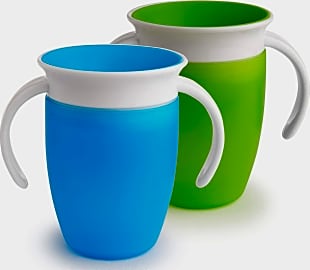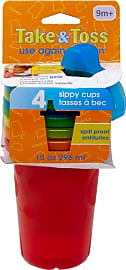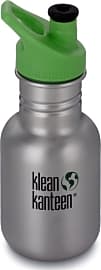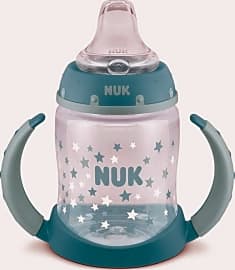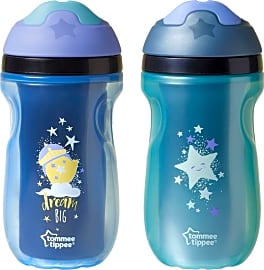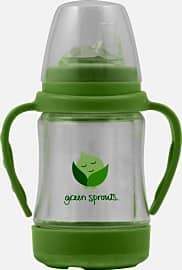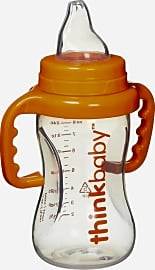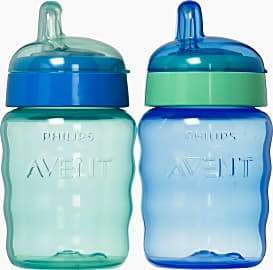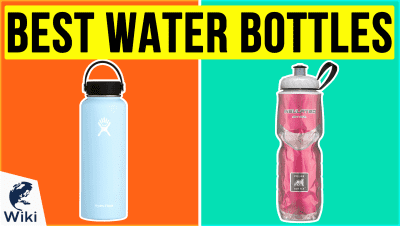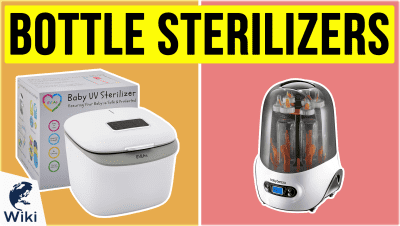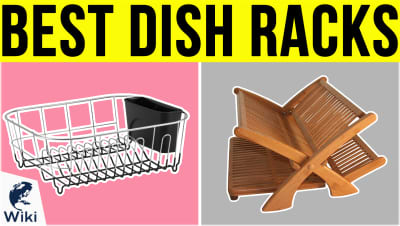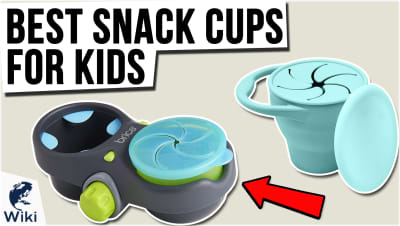The 10 Best Sippy Cups

This wiki has been updated 37 times since it was first published in April of 2016. If your little one is getting old enough to transition away from breast or bottle feeding, it's time to pick up one of these sippy cups. They come in a variety of cute, colorful options, and are specially made for toddlers to hold and drink from with ease. Whichever you select, be sure to follow manufacturer's guidelines, including whether they are safe for use in the microwave. When users buy our independently chosen editorial choices, we may earn commissions to help fund the Wiki.
Editor's Notes
April 21, 2020:
When it comes to transitioning your toddler to a drinking cup, you’ve got a wide variety of options in different sizes, shapes, and colors. Our selection includes models with drinking spouts as well as nipples similar to baby bottles, and even a completely spoutless construction like the Munchkin Miracle 360, which allows for drinking anywhere along the outer edge. For this popular choice, we changed the one on our list to a model that incorporates handles, as these are useful for small hands to grip. We also added The First Years Take & Toss to our selection in this update, which are a highly popular choice, thanks to their very low price and their disposable nature that makes them a good choice for tots who often leave their belongings behind. If you can hold onto them for multiple uses, they’re conveniently dishwasher safe. They’re sold in a multipack with four colors, so if you’ve got multiple small kids, it’ll be easy to keep track of which one belongs to whom. They replace the Nuk Active on our list, which is a popular choice but one which many users wish was see-through enough to reveal how much liquid is inside.
The American-made Nuk Fun Grips move into the top spot on the list today, and these just might be the easiest handle-less cups to hold, thanks to their pronounced hourglass shape and grooves on their surfaces. They’re also guaranteed by the manufacturer not to break, spill, or leak. They feature a generous 10-ounce capacity, which is larger than many, and there’s a space to write your child’s name in a permanent marker. For maybe the closest thing to an adult water bottle, look to the Klean Kanteen Kid, which is made of corrosion-resistant stainless steel that can last for years. It fits inside most cupholders, so you can pretty much take it anywhere. It’ll keep cold drinks cold, and the wide mouth accepts large ice cubes.
As a word of caution regarding heating up sippy cups, note that melamine is a chemical found in some plastic products that renders them unsafe for being heated in the microwave. Please read the FDA guidelines regarding melamine, and also be sure to follow the manufacturer guidelines regarding whether a given product is safe for use in the microwave.
Special Honors
Collapsacup Made of 100% food-grade silicone, this sippy can be folded down to the size of a hockey puck, making it great for on-the-go parents and families who are traveling. It also comes with a screw-on top and a sturdy sippy nipple. It also features an extra-wide base that’s sturdy and resistant to spills, which makes for fewer messes to clean up. Its unique design expels unneeded air space to reduce a baby’s air intake and help deter colic. It’s available in your choice of teal, pink, orange, and navy. It’s also sold in multi-packs, and add-on handles and extra tops are sold separately as well. It’s being funded on Kickstarter at the time of this writing. collapseandgo.com
Minnie Mouse Sippy Cup Bearing the words “Born to be Famouse,” this cup features Minnie surrounded by pink and red polka dots. It’s got double handles that make it easy for little hands to grip and a removable cap with a sipper straw. It holds up to 12 ounces and is not intended for the microwave or for hot beverages. It’s created especially for sale by Walt Disney World and Disneyland resorts. disney.com
A Brief History Of The Sippy Cup
Heck, there's even an adult version of the sippy cup made for discreetly drinking wine in public.
As is the case with many products designed for children, the sippy cup was brought into existence by a frustrated parent looking to solve a problem. In 1988, a mechanical engineer named Richard Belanger was at his wits' end dealing with the cleanup after his son spilled yet another drink.
There were products on the market at the time that were supposed to prevent spills, but they were easily outsmarted by children who quickly figured out that they leaked when turned upside down. So, Belanger set out to design a cup that didn't leak from any angle.
The first prototype of the sippy cup was essentially a bunch of Tupperware parts put together with a mouthpiece added on top. Belanger then played around with different types of valves until he eventually found one that would allow air to flow in as the child drank, which created just the right amount of pressure to trap the liquid inside. This air pressure forms a seal that keeps the contents from spilling out, even when the cup is held upside down. A few years later, he licensed the idea to Playtex, and it quickly became a success.
Today, many parents find sippy cups to be indispensable tools, especially for taking kids' beverages on the go — after all, the last thing you need is to deal with a spilled drink in the car when you're already running late. There are countless varieties available in many different styles and materials, ranging from plastic to stainless steel, and some have built-in nipples to make the transition away from bottles easier on little ones. Heck, there's even an adult version of the sippy cup made for discreetly drinking wine in public.
Providing Plenty Of Healthy Hydration
Staying hydrated is extremely important for health at any age. Every part of the body needs fluids to function properly. They help to distribute nutrients to your cells and also aid your kidneys in removing waste from your blood stream. Not giving your body enough fluids leads to dehydration, which can cause headaches, dry mouth, and fatigue.
They help to distribute nutrients to your cells and also aid your kidneys in removing waste from your blood stream.
Plain old water is the best thing to put in kids' sippy cups to keep them hydrated, and since it contains no calories, sugar, or fat, it won't contribute to weight gain. However, the lack of flavor may make it unappealing to many tots. In this case, you can add a few pieces of their favorite fruit or a small splash of juice to appease their taste buds.
Milk is a popular choice because it's a great source of calcium and vitamin D, which help to make teeth and bones strong. Whole milk is typically better than skim or 2 percent because it contains more healthy fats that are important for early brain development. It may seem counterintuitive, but some studies suggest that kids who drink low-fat milk may actually have a higher risk of being overweight.
Fruit juice can be a good source of essential vitamins, minerals, and antioxidants, but keep in mind that it is loaded with sugar and should be served to little ones sparingly. Be sure to look for "100 percent juice" on the label, as most other fruit drinks are even more sugary and have very little, if any, nutritional value.
Avoid giving children sodas, sports drinks, and anything else that's caffeinated. Caffeine doesn't just make kids hyper — it can cause stomach discomfort and trouble sleeping, and it's also a diuretic, meaning that it actually increases fluid loss.
Keeping Things Clean
Like anything else that's going to go into your baby's mouth, it is imperative to make sure that sippy cups are kept as clean as possible. They are exposed to quite a bit of bacteria on a daily basis, especially if you send them along with your kids to daycare. The tiny holes in the valves and mouthpieces provide convenient spots for mold to grow if they are not washed properly.
You may even want to soak the cup and lid in hot, soapy water for ten to fifteen minutes before washing, just to make sure any dried-on residues have a chance to loosen up.
The best way to combat the buildup of nasty particles is to rinse the cup as soon as your child is done using it. This way, any leftover liquid won't have a chance to dry. You may even want to soak the cup and lid in hot, soapy water for ten to fifteen minutes before washing, just to make sure any dried-on residues have a chance to loosen up.
In many cases, the interior valves on these cups are hard to remove, which makes your job even more difficult. But if they can be disassembled, make sure to take apart every component, including straws, stoppers, and rubber rings, so you can scrub away every last bit of debris.
It's also a good idea to run your child's sippy cups through the dishwasher on occasion, as the high temperature helps to sanitize them and gets rid of any germs lurking in hard-to-reach nooks and crannies. If you want to go one step further, you can soak sippy cups in boiling water or use a bottle sterilizer to kill off any remaining bacteria.
Sippy cups are designed to keep liquids in, so drying them thoroughly can be quite a chore, but this is an essential step because moisture makes for an excellent breeding ground for mold. Make sure to never reassemble cups until all components are completely dry, and set them on a drying rack rather than a towel to allow for maximum airflow.


